-
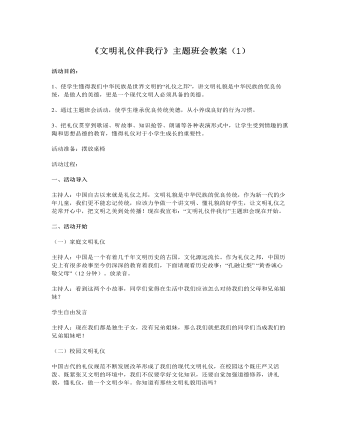
《文明礼仪伴我行》主题班会教案(1)
(一)家庭文明礼仪主持人:中国是一个有着几千年文明历史的古国,文化源远流长。作为礼仪之邦,中国历史上有很多故事至今仍深深的教育着我们,下面请观看历史故事:“孔融让梨” “黄香诚心敬父母”(12分钟)。放录音。主持人:看到这两个小故事,同学们觉得在生活中我们应该怎么对待我们的父母和兄弟姐妹?学生自由发言主持人:现在我们都是独生子女,没有兄弟姐妹,那么我们就把我们的同学们当成我们的兄弟姐妹吧!(二)校园文明礼仪中国古代的礼仪规范不断发展改革形成了我们的现代文明礼仪,在校园这个既庄严又活泼、既紧张又文明的环境中,我们不仅要学好文化知识,还要自觉加强道德修养,讲礼貌,懂礼仪,做一个文明少年。你知道有那些文明礼貌用语吗?
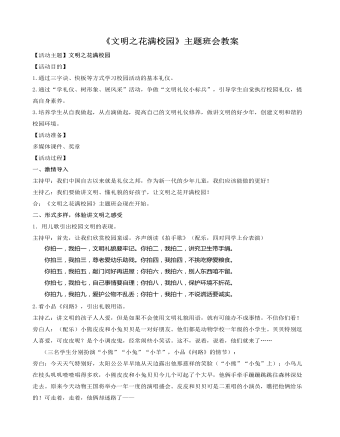
《文明之花满校园》主题班会教案
二、形式多样,体验讲文明之感受1.用儿歌引出校园文明的表现。主持甲:首先,让我们欣赏校园童谣。齐声朗读《拍手歌》(配乐,四对同学上台表演)2.看小品《问路》,引出礼貌用语。主持乙:讲文明的孩子人人爱,但是如果不会使用文明礼貌用语,就有可能办不成事情。不信你们看!旁白人:(配乐)小熊皮皮和小兔贝贝是一对好朋友。他们都是动物学校一年级的小学生。贝贝特别逗人喜爱,可皮皮呢?是个小调皮鬼,经常闹些小笑话。这不,说着,说着,他们就来了……(三名学生分别扮演“小熊”“小兔”“小羊”,小品《问路》的情节):旁白:今天天气特别好,太阳公公早早地从天边露出他那慈祥的笑脸(“小熊”“小兔”上);小鸟儿在枝头叽叽喳喳唱得多欢,小熊皮皮和小兔贝贝今儿个可起了个大早,他俩手牵手蹦蹦跳跳往森林深处走去。原来今天动物王国将举办一年一度的演唱盛会。皮皮和贝贝可是二重唱的小演员,瞧把他俩给乐的!可走着,走着,他俩却迷路了——
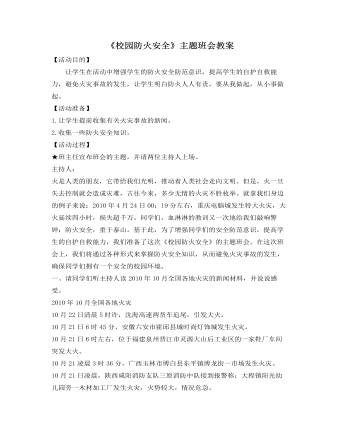
《校园防火安全》主题班会教案
3.当你遇到火灾时如何逃生?(学生答后,主持人总结如下)(1)火灾袭来时要迅速疏散逃生,不可蜂拥而出或留恋财物,要当机立断,披上浸湿的衣服或裹上湿毛毯、湿被褥勇敢地冲出去,但千万不要披塑料雨衣。(2)如遇到身上着火,可就地打滚,或用厚重衣物覆盖压灭火苗;如遇到在浓烟中避难逃生,要尽量放低身体,并用湿毛巾捂住嘴鼻。(3)大火封门无路逃生时,可用浸湿的被褥衣物等堵塞门缝,泼水降温,呼救求援;火灾袭来时,身处楼上的人员应判清火情,保持镇静,不可盲目跳楼,可用绳子或把床单撕成条状连起来,紧拴在门窗框和重物上,顺势滑下。(4)当被大火围困又没有其他办法可自救时,可用手电筒、醒目物品不停地发出呼救信号,以便消防队及时发现,组织营救。
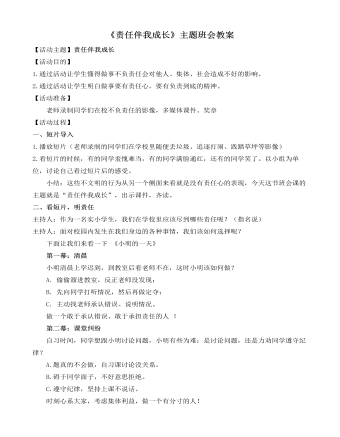
《责任伴我成长》主题班会教案
第四幕:值日事件下午放学,隔壁班同学约小明回家,可是小明是值日生,到底是回家还是做值日呢?A.回家去,反正少我一个也无所谓。B.做完值日,检查合格后再回家。C.先找一个人替我值日,以后再还他。做一个有责任感、对工作和学习认真负责的人 主持人:通过刚才我们看到的《小明的一天》,我想大家都会发现,这就是发生在我们身边的事情。微不足道的小事,却也能体现出一个人可贵的责任心,折射出一个人闪光的心灵! 2.是啊,如果我们每个同学都能这样认真负责地做好每一件事,我们的学习环境该是多么温馨,学习生活该是多么愉快啊!接下来请同学们听一个这样的故事:1982年5月28日,一列火车向关内行驶,一位铁路工人把起道机放在路线上,没拿下来,便去买冰棍。结果造成了震惊中外的火车翻车事故。造成10节车厢报废。三名旅客丧生。这次事故,原因无疑是这位工人没有尽自己的义务和责任。
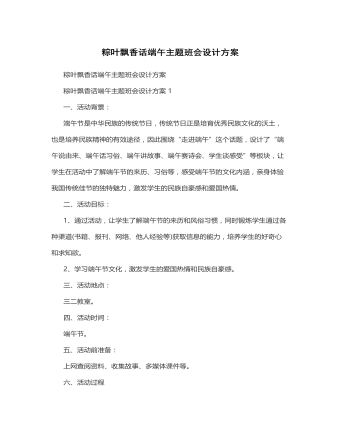
《粽叶飘香话端午》主题班会教案
一、活动背景:端午节是中华民族的传统节日,传统节日正是培育优秀民族文化的沃土,也是培养民族精神的有效途径,因此围绕“走进端午”这个话题,设计了“端午说由来、端午话习俗、端午讲故事、端午赛诗会、学生谈感受”等板块,让学生在活动中了解端午节的来历、习俗等,感受端午节的文化内涵,亲身体验我国传统佳节的独特魅力,激发学生的民族自豪感和爱国热情。二、活动目标:1、通过活动,让学生了解端午节的来历和风俗习惯,同时锻炼学生通过各种渠道(书籍、报刊、网络、他人经验等)获取信息的能力,培养学生的好奇心和求知欲。2、学习端午节文化,激发学生的爱国热情和民族自豪感。三、活动地点:三二教室。四、活动时间:端午节。五、活动前准备:上网查阅资料、收集故事、多媒体课件等。
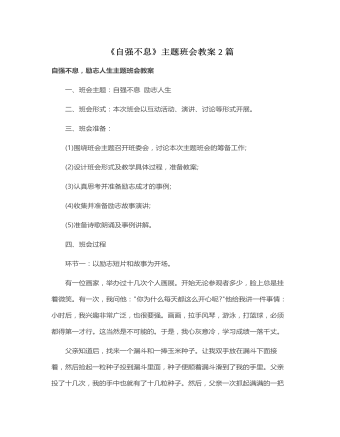
《自强不息》主题班会教案2篇
同学们,如果没有了光明,我们连最简单的事也做不了,那你能想象一个盲人会开卡丁车、会滑旱冰、会骑独轮车吗?接下来给大家推荐一本书《耳边的世界》,这本书的作者名叫陈燕,是个盲人,她的职业是一位钢琴调律师。陈燕1973年出生于河北,出生就患先天性白内障。陈燕的经历十分坎坷,因为双目失明,出生后差点被父母遗弃,后来是姥姥将她抚养大的。小时候,陈燕经常被别人欺负,于是早早体味到了人间的冷暖。在她童年的记忆中,别的小朋友都和爸妈在一起,而她却和姥姥在一起。当上帝给你关上一扇大门的时候,一定会给你打开一扇窗。因为眼睛看不见,姥姥便着力训练她的听力和触觉。在黑暗中,小陈燕一次次地撞到墙上、树上、门上、桌子上,摔得鼻青脸肿,每当这时,姥姥总让她自己爬起来,大声说:“你要想过好日子,不被别人可怜,就得付出比别人多得多的努力,因为你看不见。”就这样,伴着疼痛的记忆,她慢慢地听懂了各种物体的反射声音。根据不同的反射音,能准确地判定出不同的物体。
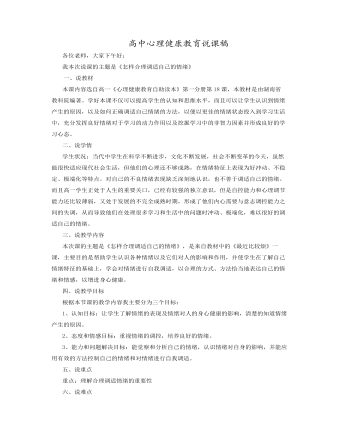
高中心理健康教育说课稿
二、说学情学生状况:当代中学生在科学不断进步,文化不断发展,社会不断变革的今天,虽然能很快适应现代社会生活,但他们的心理还不够成熟,在情绪特征上表现为好冲动、不稳定、极端化等特点。对自己的不良情绪表现缺乏深刻地认识,也不善于调适自己的情绪。而且高一学生正处于人生的重要关口,已经有较强的独立意识,但是自控能力和心理调节能力还比较薄弱,又处于发展的不完全成熟时期,形成了他们内心需要与意志调控能力之间的失调,从而导致他们在处理很多学习和生活中的问题时冲动、极端化,难以很好的调适自己的情绪。
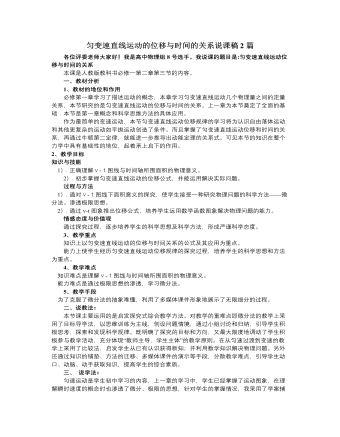
人教版新课标高中物理必修1匀变速直线运动的位移与时间的关系说课稿2篇
培养学生合作交流意识和探究问题的能力,这一部分知识层层递进,符合学生由特殊到一般、由简单到复杂的认知规律。4、互动探究(1)极限思想的渗透让学生阅读“思考与讨论”小版块.培养学生的自学和阅读能力提出下列问题,进行分组讨论:a、用课本上的方法估算位移,其结果比实际位移大还是小?为什么?b、为了提高估算的精确度,时间间隔小些好还是大些好?为什么?针对学生回答的多种可能性加以评价和进一步指导。让学生从讨论的结果中归纳得出:△t越小,对位移的估算就越精确。渗透极限的思想。通过小组内分工合作,讨论交流,培养学生交流合作的精神,以及搜集信息、处理信息的能力;通过小组间对比总结,使学生学会在对比中发现问题,在解决问题过程中提高个人能力;
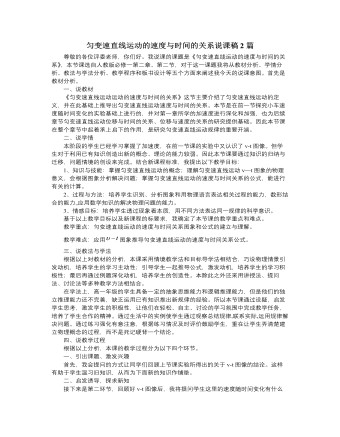
人教版新课标高中物理必修1匀变速直线运动的速度与时间的关系说课稿2篇
设计意图:几道例题及练习题,其中例1小车由静止启动开始行驶,以加速度 做匀加速运动,求2s后的速度大小?进而变式到:小车遇到红灯刹车……,充分体现了“从生活到物理,从物理到社会”的物理教学理念;例题及练习题由浅入深、由易到难、各有侧重,体现新课标提出的让不同的学生在物理上得到不同发展的教学理念。这一环节总的设计意图是反馈教学,内化知识。(6) 小结归纳,拓展深化我的理解是,小结归纳不应该仅仅是知识的简单罗列,而应该是优化认知结构,完善知识体系的一种有效手段,为充分发挥学生的主题作用,从学习的知识、方法、体验是那个方面进行归纳,我设计了这么三个问题:① 通过本节课的学习,你学会了哪些知识;② 通过本节课的学习,你最大的体验是什么;③ 通过本节课的学习,你掌握了哪些学习物理的方法?
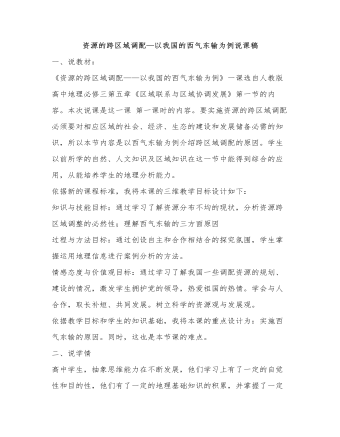
人教版高中地理必修3资源的跨区域调配—以我国的西气东输为例说课稿
由于这部分知识已要求学生在课前收集相关资料探讨分析,,现在提供机会让他们进行交流,充分发表各自的见解。所以,学生对这个知识掌握起来并不难。所以,我对这部分内容不做太多的讲解,只要做进一步的梳理,加深学生的理解即可。 第三是小结环节 在学生对西气东输工程的原因掌握之后进入的是小结环节,这里我进一步提出问题:在西气东输工程段的建设中有没有什么难关? 通过西气东输的难度了解,间接的表现我国的科技的发展,增加学生的爱国情,同时也说明西气东输的建成也有技术这一原因。从而也完成了本课时的小结。 第四环节是作业布置 在这里要求学生课后预习本课剩下的内容:思考西气东输对区域发展的影响以及为何要实施资源的跨区域调配。通过这样的问题一方面为下节课学习奠定基础,另一方面体现本课学习从“个”到“类”从特殊到一般的过程。

新人教版高中英语必修3Unit 1 Festivals and Celebrations-Reading for writing教学设计二
Step 3 Analyzing article structureActivity 31. Teachers raise questions to guide students to analyze the chapter structure of this diary and think about how to describe the festival experience. (1)What should be included in the opening/body/closing paragraph(s)?(2)How did the writer arrange his/her ideas?(3)What kind of interesting details did the writer describe?(4)How did the writer describe his/her feelings/emotions during the event?2. Students read and compare the three sentence patterns in activity 2. Try to rewrite the first paragraph of the diary with these three sentence patterns. After that, students exchange corrections with their partners. Such as:●This was my first time spending three days experiencing the Naadam Festival in China’s Inner Mongolia Autonomous Region and it was an enjoyable and exciting experience. ●I'll never forget my experience at the Naadam Festival because it was my first time to watch the exciting Mongolian games of horse racing, wrestling, and archery so closely. ●I'll always remember my first experience at the Naadam Festival in China’s Inner Mongolia Autonomous Region because it was so amazing to spend three days witnessing a grand Mongolian ceremony. Step 4 Accumulation of statementsActivity 41. Ask the students to read the diary again. Look for sentences that express feelings and emotions, especially those with the -ing form and the past participle. Such as:● …horse racing, wrestling, and archery, which are all so exciting to watch. ● some amazing performances● I was surprised to see…● I was a little worried about. . . ● feeling really tiredOther emotional statements:●I absolutely enjoyed the archery, too, but the horse races were my favourite part. ●I'm finally back home now, feeling really tired, but celebrating Naadam with my friend was totally worth it. ●He invited me back for the winter to stay in a traditional Mongolian tent and cat hot pot. I can’t wait!2. In addition to the use of the -ing form and the past participle, the teacher should guide the students in the appreciation of these statements, ask them to memorize them, and encourage them to use them reasonably in writing practice.

新人教版高中英语必修3Unit 5 The value of money-Reading and Thinking教学设计二
? Could you offer me some kind of work here?? I don’t want your charity, I just want an honest job.? Careless: I landed in Britain by accident.Step 7:Consolidation.? Find Henry? Roderick and Oliver were I .making a bet when they saw Henry, a poor young man. ? Know Henry? About a month ago, Henry was sailing and later he found himself carried out to sea by a strong wind. Fortunately, he 2.was spotted by a ship. And it was the ship that brought him to 3.England? Offer money to Henry ? Oliver and Roderick gave Henry a letter and told him that there was money in it. They 4.persuaded him to accept it, and made him 5.promise that it wouldn't be opened until 2 o'clock.Step 8:Language pointsa large amount of: a large quantity of; a great deal ofe.g. They bought a large amount of furniture before they moved their new house.make a bet: make an arrangement to risk money, etc. on an event of which the result is doubtful.e.g. We made a bet on the result of the match.permit sb to do something: allow somebody to do somethinge.g. My mother doesn’t permit me to ride in the street after it rained.by accident: as a result of chancee.g. I only found it by accident.stare at: look at somebody or something with the eyes wide open in a fixed gaze( in astonishment, wonder, fear, etc)to be honest: to tell you the truth; to be franke.g. To be honest, I don’t think we have a chance of winning.Step7 Homework:What do you think will happen to Henry? Will the bank-note help him or get him into trouble?

新人教版高中英语必修3Unit 5 The Value of Money-Reading for Writing教学设计二
2. 您能看到, 我头发太长了。You can see that my hair is much too long.3. 无论什么时候, 只要您想回来就回来。Please come back whenever you want.4. 您仅有很少的头发要理! You only have too little hair to cut !5. 为您服务是我的荣幸!It is my honour to serve you!Step 9 Writing(Henry is walking down the street when he sees a sign for a place that cuts hair. He decides to have it cut. )H=Henry B=BarberH: Good afternoon, I’d like to have my hair cut, if I may. (The barber looks at Henry’s hair and continues cutting another man’s hair. ) Er, I’d really like a haircut. As you can see it’s much too long. B: (in a rude manner) Yes, I can see that. Indeed, I can. H: Fine, well, I’ll have a seat then. (He sits in one of the barber’s chairs. The barber turns to look at Henry. )B: It’s quite expensive here, you know! Are you sure you can afford it?H: Yes. I think so. (After his hair is cut, the barber tells Henry how much he must pay. Henry shows the barber the bank note. )B: Why Mr. . . (looks shocked)H: Adams. Henry Adams. I’m sorry. I don’t have any change. B: Please don’t worry! (wearing a big smile) Nothing to worry about! Nothing at all! Please come back whenever you want, even if you only have too little hair to cut! It will be my honour to serve you!Step 10 Pair workExchange drafts with a partner. Use this checklist to help your partner revise his/her draft.1. Are all the elements of a play included and in good order ?2. Do the character use suitable language ?3. Are the stage directions clear and useful ?4. Is the plot clear and exciting enough ?

新人教版高中英语必修3Unit 4 Space Exploration-Listening&Speaking&Talking教学设计二
The themes of this part are “Talk about how to become an astronaut” and “Talk about life in space”. As Neil Armstrong said “Mystery creates wonder and wonder is the basis of man’s desire to understand. Space is difficult for human to reach, therefore, humans are full of wonders about it. However, if wanting to achieve the dream of reaching the Moon, some of our human should work hard to be an astronaut at first. Part A(Talk about how to become an astronaut) is a radio interview in a radio studio, where the host asked the Chinese astronauts about his story how to become an astronaut. Yang Liwei told his dreamed to be an astronaut since childhood. Then he worked hard to get into college at 22. The next 10 years, he gradually became an experienced pilot. At the same time, to be an astronaut, he had to study hard English, science and astronomy and trained hard to keep in good physical and mental health and to practise using space equipment. Part B (Talk about life in space) is also an interview with the astronaut Brown, who is back on the earth. The host Max asked about his space life, such as his emotion about going back the earth, the eating, shower, brushing, hobbies and his work. Part A and Part B are interviews. So expressing curiosity about the guests’ past life is a communicative skill, which students should be guided to learn.1. Students can get detailed information about how Yang Liwei became an astronaut and Max’s space life.2. Students learn to proper listening strategy to get detailed information---listening for numbers and taking notes.3. Students can learn related sentences or phrases to express their curiosity like “ I wish to know...” “I’d love to know...”4. Students can learn more about the space and astronauts, even be interested in working hard to be an astronaut

新人教版高中英语必修3Unit 4 Space Exploration-Reading and Thinking教学设计二
The theme of this unit focuses on “space exploration.” Students will learn about the training and experience needed to become an astronaut. The text is mainly about the development of space exploration. On the one hand, the text helps students to have a good understanding about the great feats humans have achieved, on the other hand, they will further understand the contributions that we Chinese have achieved, and feel confident and proud about our homeland and strengthen their love for our country. The teacher should instruct students to aim high and study harder to make great progress in the space career if possible.1. Read about the development and value of space exploration.2. Explore the mysteries of the universe and the achievements in space exploration.3. Skillfully use the vocabulary of this text to cultivate self-study ability 4. Develop cooperative learning ability through discussion.1. Enable the Ss to talk about the development and value of space exploration.2. Guide the Ss to summarize the main idea of each paragraph as well as the main idea of the text.3. Help Ss comprehend the main reasons for space exploration. Multi-media, textbook, notebooks.Step 1: Warming up and predictionLook at the title and the pictures of the text and predict what the text will be about?2. What are the main reasons for space exploration?

新人教版高中英语必修3Unit 4 Space Exploration-Reading for Writing教学设计二
⑦在我看来, 探索太空是值得的。As far as I am concerned, it is worthwhile to explore the space.Step 10 Writing---draftRecently, students in our class have had heated a discussion on whether space is worth exploring. Students hold different ideas about it.30% of us think space exploration is not worthwhile. They think space is too far away from us and our daily life and is a waste of money. And the money spent on space exploration can be used to solve the earth’s problems such as starvation and pollution.On the other hand,70% think space is worth exploring because we have benefited a lot from it,such as using satellites for communication and weather forecast. What’s more,with further space research,we may solve the population problem by moving to other planets one day. Also,space research will enable us to find new sources to solve the problem of energy shortages on the earth.As far as I am concerned, it is worthwhile to explore the space. Not only can it promote the development of society but also enrich our life. Step 11 Pair workExchange drafts with a partner. Use this checklist to help your partner revise his/her draft.1.Does the writer explain why he/she changed/wanted to change?2.Does the writer tell how the changes have improved or will improve his/her life?3.Is the text well-organised?4.Does the writer use words and expressions to show similarities and differences?5.Are there any grammar or spelling errors?6.Does the writer use correct punctuation?
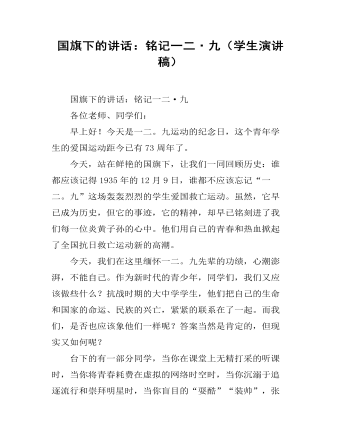
国旗下的讲话:铭记一二·九(学生演讲稿)
国旗下的讲话:铭记一二·九 各位老师、同学们:早上好!今天是一二。九运动的纪念日,这个青年学生的爱国运动距今已有73周年了。今天,站在鲜艳的国旗下,让我们一同回顾历史:谁都应该记得1935年的12月9日,谁都不应该忘记“一二。九”这场轰轰烈烈的学生爱国救亡运动。虽然,它早已成为历史,但它的事迹,它的精神,却早已铭刻进了我们每一位炎黄子孙的心中。他们用自己的青春和热血掀起了全国抗日救亡运动新的高潮。今天,我们在这里缅怀一二。九先辈的功绩,心潮澎湃,不能自己。作为新时代的青少年,同学们,我们又应该做些什么?抗战时期的大中学学生,他们把自己的生命和国家的命运、民族的兴亡,紧紧的联系在了一起。而我们,是否也应该象他们一样呢?答案当然是肯定的,但现实又如何呢?台下的有一部分同学,当你在课堂上无精打采的听课时,当你将青春耗费在虚拟的网络时空时,当你沉溺于追逐流行和崇拜明星时,当你盲目的“耍酷”“装帅”,张扬你所谓的“个性”时,不知你是否想到了作为当代青少年那肩头沉重的使命感?
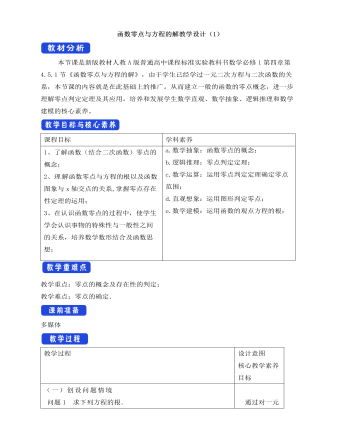
人教A版高中数学必修一函数的零点与方程的解教学设计(1)
本节课是新版教材人教A版普通高中课程标准实验教科书数学必修1第四章第4.5.1节《函数零点与方程的解》,由于学生已经学过一元二次方程与二次函数的关系,本节课的内容就是在此基础上的推广。从而建立一般的函数的零点概念,进一步理解零点判定定理及其应用。培养和发展学生数学直观、数学抽象、逻辑推理和数学建模的核心素养。1、了解函数(结合二次函数)零点的概念;2、理 解函数零点与方程的根以及函数图象与x轴交点的关系,掌握零点存在性定理的运用;3、在认识函数零点的过程中,使学生学会认识事物的特殊性与一般性之间的关系,培养数学数形结合及函数思想; a.数学抽象:函数零点的概念;b.逻辑推理:零点判定定理;c.数学运算:运用零点判定定理确定零点范围;d.直观想象:运用图形判定零点;e.数学建模:运用函数的观点方程的根;
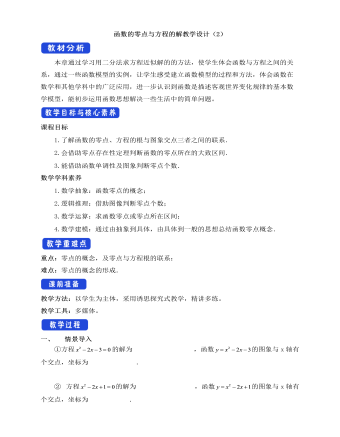
人教A版高中数学必修一函数的零点与方程的解教学设计(2)
本章通过学习用二分法求方程近似解的的方法,使学生体会函数与方程之间的关系,通过一些函数模型的实例,让学生感受建立函数模型的过程和方法,体会函数在数学和其他学科中的广泛应用,进一步认识到函数是描述客观世界变化规律的基本数学模型,能初步运用函数思想解决一些生活中的简单问题。1.了解函数的零点、方程的根与图象交点三者之间的联系.2.会借助零点存在性定理判断函数的零点所在的大致区间.3.能借助函数单调性及图象判断零点个数.数学学科素养1.数学抽象:函数零点的概念;2.逻辑推理:借助图像判断零点个数;3.数学运算:求函数零点或零点所在区间;4.数学建模:通过由抽象到具体,由具体到一般的思想总结函数零点概念.重点:零点的概念,及零点与方程根的联系;难点:零点的概念的形成.
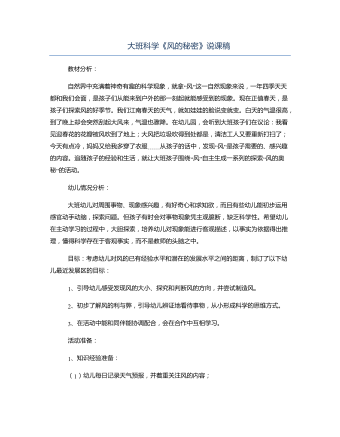
大班科学《风的秘密》说课稿
自然界中充满着神奇有趣的科学现象,就拿“风”这一自然现象来说,一年四季天天都和我们会面,是孩子们从能来到户外的那一刻起就能感受到的现象。现在正值春天,是孩子们探索风的好季节。我们江南春天的天气,就如娃娃的脸说变就变。白天的气温很高,到了晚上却会突然刮起大风来,气温也骤降。在幼儿园,会听到大班孩子们在议论:我看见迎春花的花瓣被风吹到了地上;大风把垃圾吹得到处都是,清洁工人又要重新打扫了;今天有点冷,妈妈又给我多穿了衣服……从孩子的话中,发现“风”是孩子需要的、感兴趣的内容。追随孩子的经验和生活,就让大班孩子围绕“风”自主生成一系列的探索“风的奥秘”的活动。大班幼儿对周围事物、现象感兴趣,有好奇心和求知欲,而且有些幼儿能初步运用感官动手动脑,探索问题。但孩子有时会对事物现象凭主观臆断,缺乏科学性。希望幼儿在主动学习的过程中,大胆探索,培养幼儿对现象能进行客观描述,以事实为依据得出推理,懂得科学存在于客观事实,而不是教师的头脑之中。